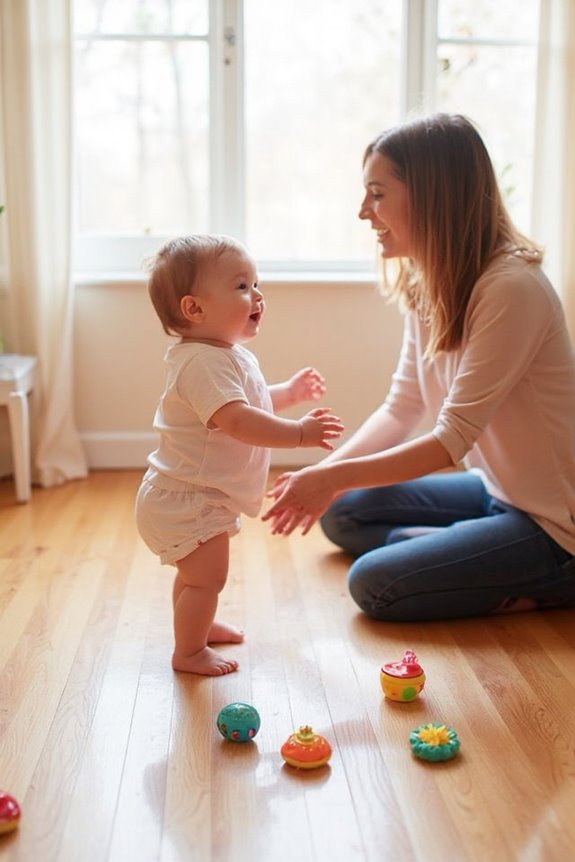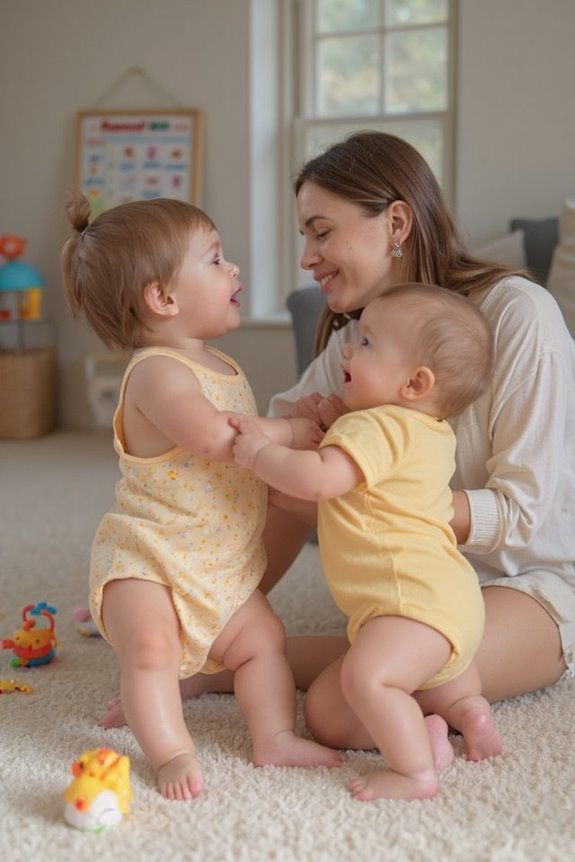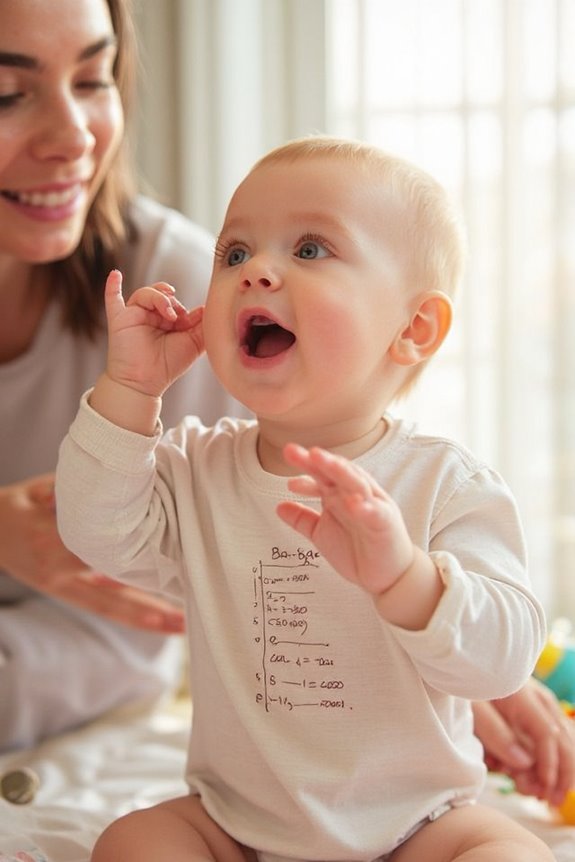Most babies take their first independent steps between 9-18 months, with the average age being around 12 months. Before walking, your baby will develop through key stages including sitting (6 months), crawling (6-10 months), and cruising along furniture (9-12 months). I recommend creating safe exploration spaces and offering balance support during early attempts. If your child hasn’t walked by 18 months, consult your pediatrician. The following sections explore how to best support this exciting milestone.
Key Takeaways
- Most babies take their first steps around 12 months of age.
- The normal range for walking development is between 9-18 months.
- Babies typically walk independently 2-3 months after standing alone.
- Early walking readiness signs include pulling up, cruising furniture, and standing unsupported.
- Consult a pediatrician if your baby hasn’t walked by 18 months.
Normal Age Ranges for First Steps
Three key time periods mark the typical walking journey for babies. The early walkers may begin taking independent steps around 9 months, while most babies achieve this walking milestone at approximately 12 months of age. Late bloomers, who are still developing normally, might not walk until 17-18 months.
The 9-18 month window represents the normal range for this essential aspect of baby development. I’ve observed that each child follows their own timeline, influenced by various factors including genetics and environment.
If your baby hasn’t started walking by 18 months, it’s worth discussing with your pediatrician. Remember that this developmental spectrum is broad, and most babies who fall anywhere within it are progressing perfectly well.
Key Developmental Stages Before Walking
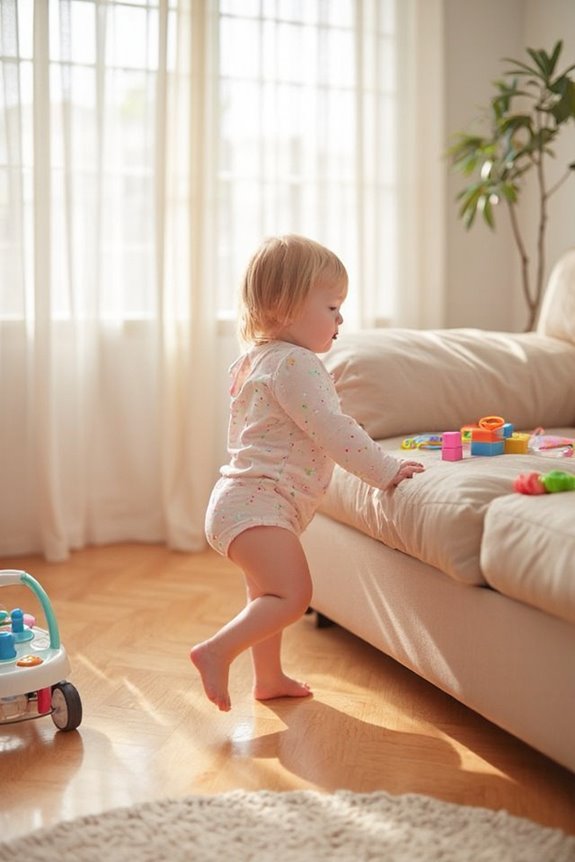
Before babies take their first independent steps, they must master several important developmental skills. The journey typically begins with babies learning to sit independently around 6 months, building essential core strength.
Between 6-10 months, babies develop motor skills through creeping and crawling, followed by pulling themselves up to stand between 7-10 months. This progression strengthens leg muscles and improves coordination.
By 9-12 months, most infants can stand while holding furniture and practice weight transfer from one leg to another. During this time, cognitive development plays a significant role as babies:
- Build confidence in their physical abilities
- Develop problem-solving skills for maneuvering obstacles
- Learn through observation and imitation
- Explore their environment out of curiosity
Providing safe, supervised spaces with secure furniture supports this developmental journey.
How to Support Your Baby’s Walking Journey
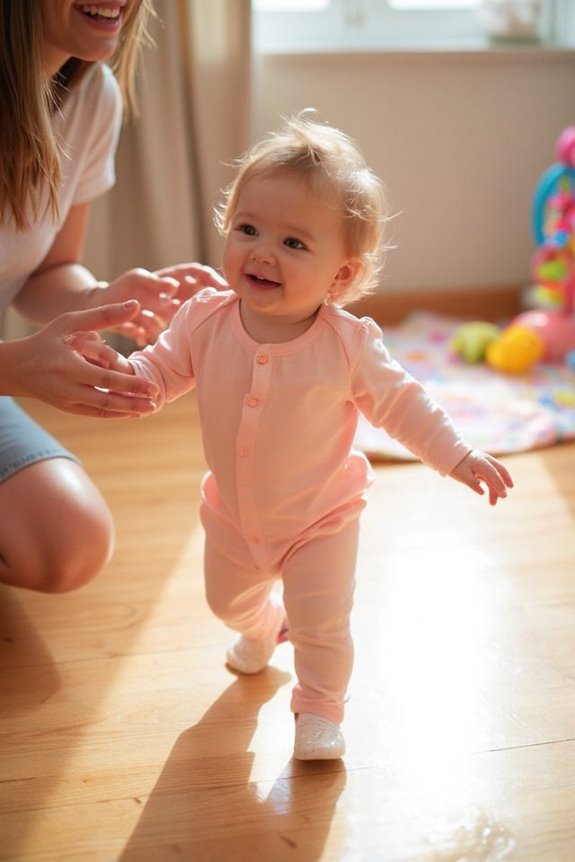
Supporting your baby’s journey toward walking is an exciting phase that requires patience, encouragement, and creating the right environment. I’ve found that consistent supportive activities can make a significant difference in your child’s development.
Consider these approaches:
- Kneel down and offer your hands for balance during early attempts
- Create safe spaces for cruising along furniture
- Engage in encouraging playtime that builds confidence with movement
- Provide regular opportunities for muscle-building activities like pulling up
Most babies will walk independently within 2-3 months after learning to stand alone. Remember that development varies—some children walk as early as 9 months while others may not take their first steps until 18 months. Your patience and consistent support are key factors in helping your baby master this important milestone.
Creating a Safe Environment for New Walkers
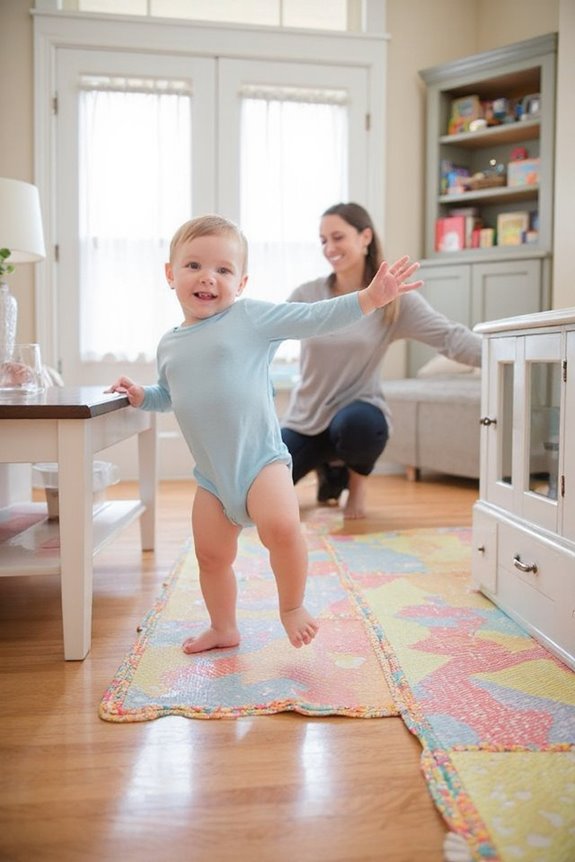
Once your baby becomes mobile, creating a safe environment becomes the top priority for your home. Toddler safety requires a thorough approach to childproofing.
For indoor spaces:
- Cover electrical outlets with tamper-resistant plugs
- Install gates at stairs and doorknob covers for off-limits rooms
- Arrange furniture with ample movement space
- Secure heavy objects that could tip over
Create designated play areas with:
- Soft flooring materials like mats to cushion falls
- Clear spaces free from clutter and tripping hazards
- Stable toys that won’t cause injury
Don’t forget outdoor safety:
- Walk on smooth sidewalks rather than rough terrain
- Always supervise children in baby walkers
- Be cautious around stairs, hills, and ramps
Constant supervision remains essential even with these precautions in place.
Signs of Walking Readiness to Watch For
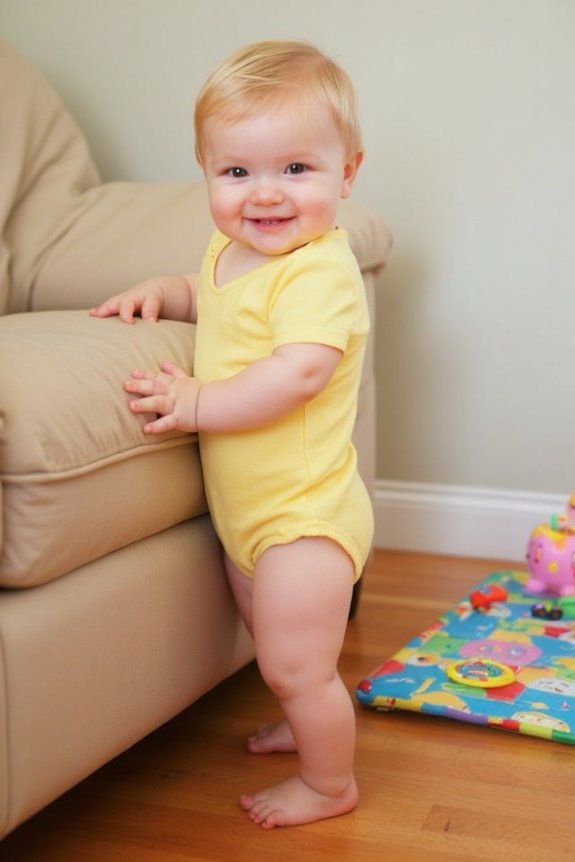
Many parents enthusiastically anticipate their baby’s first steps, but walking doesn’t happen overnight. Your baby will show several key indicators that they’re preparing for this milestone.
Watch for these signs of walking readiness:
- Pulling up to stand – This strengthens leg muscles and develops coordination
- Furniture cruising – Moving while holding onto objects helps with balance
- Standing without support – Even briefly shows growing standing confidence
- Weight shifting – Transferring weight from one foot to another
- Increased exploration – More curiosity about surroundings
Most babies start walking between 10-18 months, with the average around 12 months. Remember that development varies widely—some babies may skip crawling entirely, while others perfect crawling before taking their first steps.
Frequently Asked Questions
Can Twins Develop Walking Abilities at Different Times?
Absolutely, I’ve seen twins develop walking coordination at lightning speed apart! As a developmental expert, I can assure you that twin milestones often occur at different times due to individual variability in their unique developmental journeys.
Do Shoes Help or Hinder a Baby Learning to Walk?
I generally recommend limiting shoes for new walkers. Most shoe types can hinder natural foot development. I suggest barefoot walking indoors and soft, flexible shoes outdoors only when needed for protection.
Does Early Walking Indicate Higher Intelligence?
No, I can assure you that early walking doesn’t indicate higher intelligence. Early development of motor skills and intelligence are separate processes, influenced by different genetic and environmental factors that don’t directly correlate with each other.
Should I Worry if My Baby Skips Crawling Altogether?
I’ve seen THOUSANDS of babies skip crawling milestones without issues! As a pediatric specialist, I can assure you that developmental variations are completely normal. Don’t worry if your baby finds their own unique path to mobility.
Do Heavier Babies Typically Walk Later Than Lighter Babies?
I’d say there’s no strong evidence that baby weight directly delays walking. Development milestones vary widely, and while heavier babies might have different physical challenges, many other factors influence when your little one starts walking.

